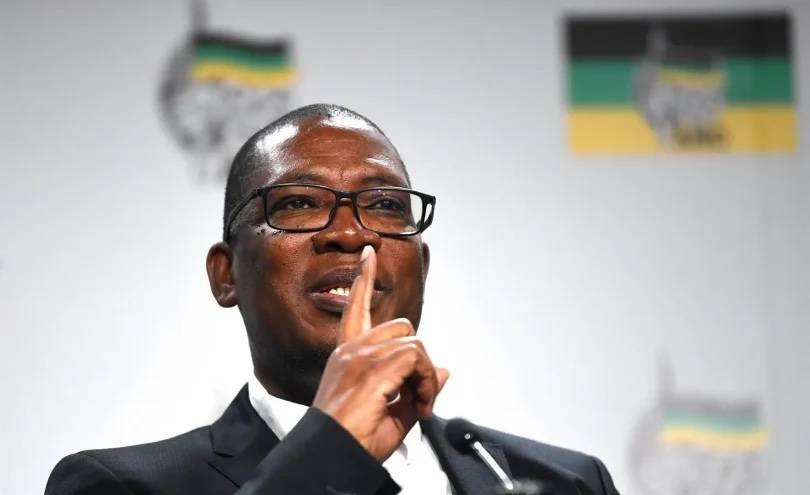
Gauteng Premier Panyaza Lesufi
Gauteng Premier Panyaza Lesufi's grand plans for economic growth will remain a pipe dream unless underlying problems that hold back investment, such as crime and unclear policies, are addressed, says Gauteng Democratic Alliance leader Solly Msimanga.
“Investors are hesitant to pump money into a state where crime is rampant and government economic policies are unclear. Without a stable and secure environment, no amount of job creation programmes will be successful,” Msimanga said in response to Lesufi's state of the state address on Thursday.
Msimanga said Lesufi's state unity government was failing to grow the economy because it could not crack down on rising crime and corruption and upgrade the state's poor roads.
The provincial government is made up of the ANC and several smaller parties, including the Inkatha Freedom Party, Rise Mzansi and the Patriotic Alliance.
The ANC holds seven key posts, with the minority partners each allocated one. Together they hold 33 of the 80 seats in the provincial assembly. The provincial unity government does not include the DA, which has 22 seats, or the Economic Freedom Fighters (EFF), which has 11 seats.
Lesufi said the government was “working hard to stop the spread of land invasions and illegal mining, eradicate drug trafficking and use, eliminate the culture of hire-for-kill, eradicate the possession of illegal firearms and prevent vehicle hijacking.”
He said he would work to protect children and women from perpetrators of gender-based violence, abduction and human trafficking.
Government investment in law enforcement, including the provision of new vehicles, helicopters and drones, was part of a wider strategy to address these issues.
“We are working hard to make Gauteng safer for all our residents,” the premier said, acknowledging that progress has been made but more needs to be done.
He said Gauteng, the country's economic hub, had managed to attract more than R137 billion in investment from global corporations, banks and food companies, adding that the provincial government was working hard to address the power supply shortage.
“Just six months after this commitment, we have installed 485 transformers in Ekurhuleni, Vaal, Johannesburg, the West Rand and Tshwane, bringing significant relief to communities who were struggling with not having electricity,” he said.
“To date, 28 health facilities, including clinics, hospitals, community health care centres and five schools, have received alternative energy supplies. As we move forward, we have launched priority areas for the second phase of our Energy Response Plan and developed a roadmap to identify 3,000 megawatts to add to the national grid.”
But Msimanga said Lesufi's government was not winning the battle to cut jobs in the province, where Statistics South Africa data released this week showed the employment rate was 38.6 percent and youth unemployment stood at 50 percent.
He said the “Nasi Ispani” scheme, touted by Lesufi as a quick fix to the unemployment problem, had failed to produce tangible results.
“The prime minister's lofty promises are meaningless if not backed up by effective action. Unemployment is increasing rather than decreasing, which is direct evidence of the failure of this government to create a conducive environment for economic growth,” Msimanga said.
His criticism comes against the backdrop of the recent termination of contracts with 32,000 teacher aides employed by the state government over the past two years.
The firings betray a previous promise from Lesufi that those contracts would be extended for a further 12 months. “This is a devastating blow to the thousands of young people who relied on these jobs,” Msimanga said.
“The Gauteng government has effectively turned its back on its promise to tackle youth unemployment.
Lesufi said terminating the teaching assistants’ contracts was a difficult decision, explaining that financial constraints made it necessary.
“I'm proud that our state is the only state to have extended our contract for this long, but the realities of our fiscal situation have forced us to make tough choices,” he said.
EFF Gauteng representative Nkululeko Dunga said Lesufi's promises to bring solutions to the province were “more of a slogan than a substantive strategy”.
“Gauteng continues to record the highest crime rate in the country… it also has the highest rate of violent crime (1,787 cases in the last quarter) and sexual crimes account for more than 20 per cent of the national total,” he said, adding that the Nathi Ispani campaign was a publicity stunt to garner votes.
“We call on the Gauteng government to avoid leaving these young people in limbo and find a solution to get them back into the workplace and onto other skills development and employment programmes in the province,” Dunga said.
Lesufi said despite the layoffs, about 130,000 previously unemployed residents had secured jobs through government initiatives over the past year.
He said the Gauteng government had signed a R1.1 billion agreement with the National Skills Fund and an R8 billion deal with the Unemployment Insurance Fund to reskill about 500,000 unemployed people.
“We recognize the potential of this program, but financial constraints are a reality that can only be overcome by proactively exploring funding opportunities and partnerships,” Lesufi added.

